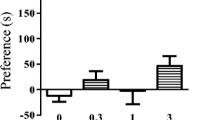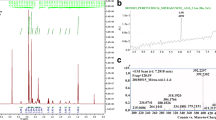Abstract
Development of tolerance to opiates involves various neurochemically and pharmacologically distinct processes. For instance, the diversity of opiate tolerance has been suggested by experiments comparing the establishment of diminished response to different effects of opiate agonists. Antagonists acting at N-methyl-d-aspartate (NMDA) receptors has become a very useful tool for studying opiate tolerance mechanisms since these drugs have been shown to retard the development of tolerance to analgesic properties of opiates. The present study compared the ability of two NMDA receptor channel blockers, dizocilpine and memantine, to affect the development of tolerance to morphine analgesia induced by repeated social defeat or by repeated morphine administrations. Male BALB/c mice were assessed for the tail-flick response before and after the defeat in five social confrontations, or before and after repeated morphine injections (20 mg/kg, s.c., once daily for 8 days). Repeated morphine injections were explicitly paired with environmental cues. Socially-defeated as well as morphine-treated mice developed significant tolerance to morphine analgesia. Separate groups of mice were exposed to repeated social confrontations or injections of morphine with each defeat or morphine injection followed by administration of either dizocilpine (0.03–0.3 mg/kg, i.p.) or low-affinity channel blocker memantine (3–30 mg/kg, i.p.). Both dizocilpine and memantine were effective in preventing the development of repeated morphine-induced tolerance to acute morphine analgesia. Treatments with NMDA receptor antagonists that retarded development of non-associative tolerance also suppressed the establishment of associative tolerance significantly. Social defeat-induced tolerance was prevented by dizocilpine but not by memantine. Our results suggest some degree of similarity in the mechanisms of morphine analgesic tolerance induced by pharmacological, contextual and social stimuli.
Similar content being viewed by others
Author information
Authors and Affiliations
Additional information
Received: 13 December 1997 / Accepted: 15 April 1998
Rights and permissions
About this article
Cite this article
Belozertseva, I., Bespalov, A. Effects of NMDA receptor channel blockers, dizocilpine and memantine, on the development of opiate analgesic tolerance induced by repeated morphine exposures or social defeats in mice. Naunyn-Schmiedeberg's Arch Pharmacol 358, 270–274 (1998). https://doi.org/10.1007/PL00005252
Issue Date:
DOI: https://doi.org/10.1007/PL00005252




